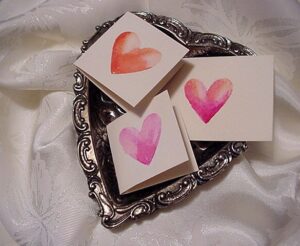
Photo credit: flickr.com/photos/eraphernalia_vintage/3385674435
Terumah: Bringing The Gifts Of Your Life
Rabbi Jill Berkson Zimmerman
One day, I was perusing my dear friend Karen’s bookshelves because I was always interested in what new finds she had acquired. She commented to me that she had stopped purchasing new books, and instead was beginning to focus on integrating what she already knew. This stopped me in my tracks, because I’m a lifelong pursuer of new learning and inspiration, and a voracious reader with a huge library. She and I shared that in common.
Karen, one of my wisest friends, led me to consider the idea of looking inside for inspiration and revelation, instead of seeking elsewhere. Yes, I still purchase new books and pursue new learning, but I also became deeply interested in seeing my own experiences as a repository of wisdom.
This is an especially poignant suggestion as I realize that there are fewer years ahead of me than there are behind me. What if my own experiences are like seeds of wisdom that become the gifts I contribute to the world? How might I collect and share what I believe, value, and create? These seeds may begin in the soil of what I have learned from books or teachers, but they become new gifts when nurtured by the nutrients of my own labor.
Gifts are at the heart of constructing the holy sanctuary that we read about in Terumah. God, via Moses, instructs the Israelites to bring gifts that they are authentically moved to give from their hearts: “Tell the Israelite people to bring Me gifts: you shall accept gifts for Me from every person whose heart so moves them.” (Ex. 25:2)
They do not have to create something new. They are encouraged to give from what they already have.
These gifts of the heart help create the sanctuary, the mishkan, where God dwells and is experienced by the community. God dwells among them “b’tocham” in this holy place: “And let them make Me a sanctuary, that I may dwell among them.” Ex. 25:8)
In the middle of this mishkan sits the ark, which contains the Torah that is given on Mount Sinai. Our blessed rabbis believed that Torah contains not only the tablets with the 10 Commandments inscribed upon it but all Jewish wisdom, even that which has not yet been revealed.
Just like the Torah in the ark that continually teaches and is the enduring gift at the center of Judaism, we each have a Torah that we write with our own lives. This is our gift to the world, to our families and our communities.
The Sfat Emet (Yehudah Aryeh Leib Alter) writes: “Every person has his or her own piece of Torah. The complete Torah was given to the Jewish people as a whole. However, each person has a personal teaching, his or her own Torah, inside them. This is hidden within the soul. There is a piece of Torah that can be learned from every person.”
Each one of us writes a Torah that unfolds and evolves until our last breath. It is a Torah that we have woven from our unique blend of gifts and talents, the opportunities we have created, and all we have learned. It also contains the sorrows and pain and hard-won blessings we have wrestled from our stuggles.
Our Torah contains not only the “who what why and when” of the events and experiences of our lives, but more importantly, the meanings we have derived. It is about what we have learned, what has endured, and what values we hold most dear.
This is the gift we offer as we turn the corner toward collecting what we already know: What do I know for sure? What wisdom do I want to pass on? What values have I lived? How do I want to be known and remembered?
Our Torah is the sacred offering of our hearts. And yes, it contains what we have learned from books and from teachers – but even more, it holds the offering that only we can give. Our Torah is completely unique to us and should be taken seriously. As Rabbi Laura Geller writes, “All theology is autobiography.”
When I sit with a family who has lost a loved one, I ask them: What was their Torah? What did you learn from the way they lived their life? What were their sacred stories?
As I listen to the waterfall of stories pour out of the family in front of me, it feels like we are building a mishkan, a holy dwelling place, created by the Torah that their loved ones lived and shared. It is indeed a gift to witness. Rabbi Lawrence Kushner writes: “…every soul has a Torah. To hear another say Torah is a precious gift. For each soul, by the time of his or her final hour, the Torah is complete, the teaching done.”2
Terumah reminds me, like the lesson I learned from my friend Karen, to focus on the gifts of my heart and my life.
It has been my personal experience that when we create spaces for people to share their unique gifts, our sacred stories, and our Torah, we do indeed form a holy community where God dwells.
[1] Rabbi Laura Geller, The Torah of Our Lives” in Beginning Anew, A Woman’s Companion to the High Holy Days by Gail Twersky Reimer and Judith A Kates, Touchtone Books, 1997
[2] Kushner, Lawrence. God Was in This Place and I, I Did Not Know: Finding Self, Spirituality and Ultimate Meaning. Woodstock, VT: Jewish Lights Publishing, 1993, 177









0 Comments